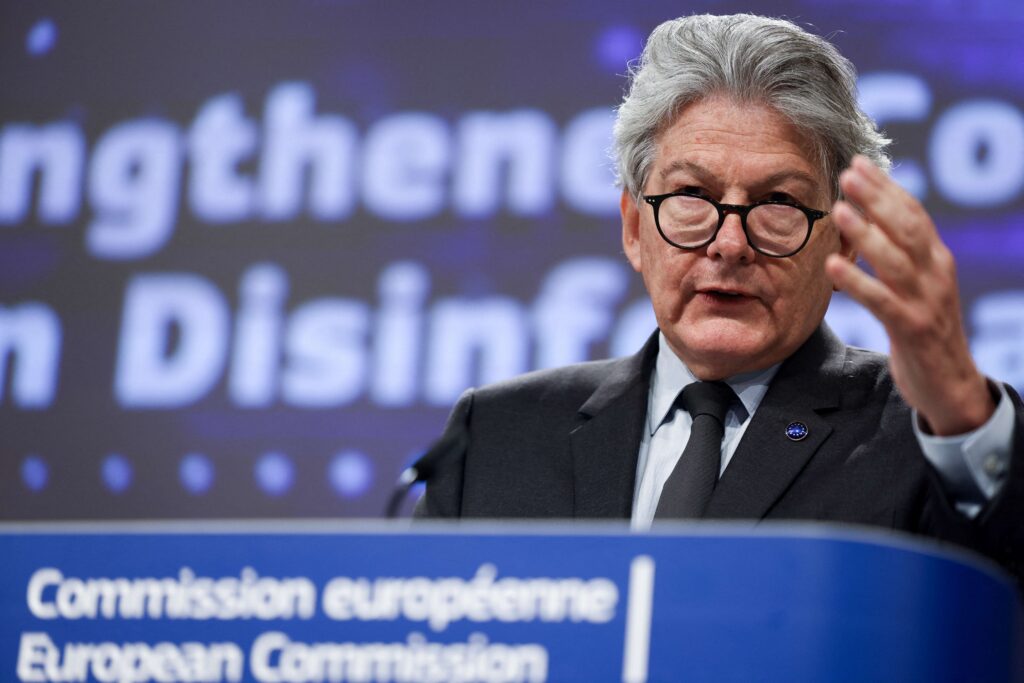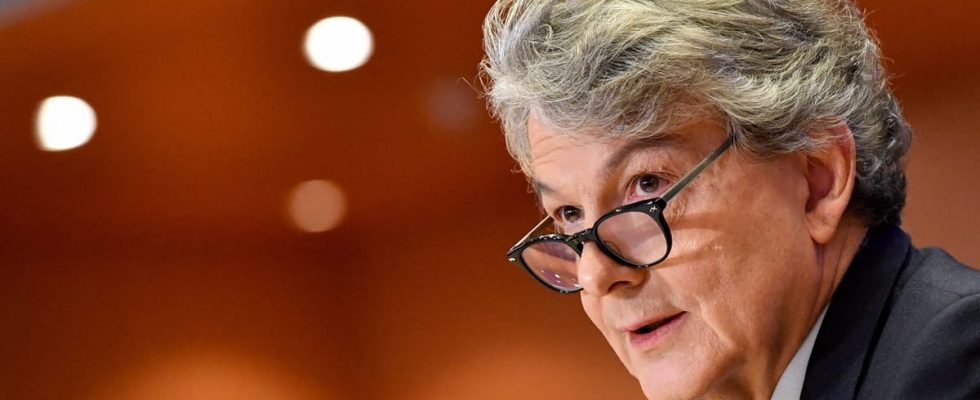BRUSSELS — When Thierry Breton first floated the idea of becoming European Commission president, not even he seemed to take the idea very seriously.
“I may be able to consider a new Plan B assignment,” the internal market commissioner replied with a smile, when asked at a POLITICO event whether he wanted the top job, prompting laughter.
But as the European Parliament election draws closer, Breton’s “Plan B” pitch to take over leadership of the EU executive is coming into greater focus.
A former minister and tech CEO who was France’s second choice for European commissioner, Breton amassed a vast amount of power within the Berlaymont building where the commissioners sit, putting his stamp on everything from COVID vaccines to artillery shells for Ukraine’s war effort to enforcement of the EU’s digital rules. His job — overseeing the hallowed single market of the 27 EU member countries — is one of the most critical portfolios in Brussels, and previous occupants of the post have included former Italian Prime Minister Mario Monti and heavyweight French conservative politician Michel Barnier.
Now, Breton looks poised to grab even more clout as his main rival inside the Commission, the more economically liberal Danish antitrust czar Margrethe Vestager, eyes a new role heading up the European Investment Bank (EIB).
While being powerful in the Commission is no guarantee of becoming its leader — he would need backing from all of Europe’s leaders, plus the confirmation of Parliament — Breton is doing everything he can to make himself look unavoidable for the next five years, according to numerous Commission officials and political aides who spoke to POLITICO on condition of anonymity to discuss confidential deliberations. That included using his influence to help block the appointment of U.S. economist Fiona Scott Morton to a senior advisory role in the EU executive.
And while von der Leyen remains the most plausible “Plan A” answer to heading the EU executive after the 2024 elections, growing uncertainty around her intentions means opening the field to other contenders — including Breton.
“It’s obvious that Breton wants this job,” said a senior political aide. “In fact, it’s becoming more obvious every day.”
The prospect of having Breton as Commission president is sure to be unnerving to smaller EU countries who fear he could be an agent for France.
It may also cause concern in Washington, as Breton presents a far less transatlantic profile than von der Leyen and has taken tough stances against Big Tech, calling himself Europe’s digital “enforcer.”
Even if Breton does not clinch the top job, the various Commission officials and political aides contacted for this article said he could still aim for a supercharged role as Commission vice president in the next term, overseeing enforcement of the bloc’s tech rule books. These include the Digital Services Act, which covers online content; and the Digital Markets Act, which seeks to promote fair competition in the digital space.
Asked whether Breton would stay at the Commission for another term, a spokesperson for his office declined to comment; a spokesperson for Breton’s liberal Renew Europe group in Parliament also declined to comment for this article.
Politician in CEO’s clothing
Breton’s Plan B pitch for the top job may strike some as improbable. But so, too, was his path into the Commission four years ago, when his name came into consideration at the last minute as the original French pick, former member of European Parliament Sylvie Goulard, was knocked out amid scrutiny of her outside consulting work.
At the Commission, Breton has managed to cultivate the image of an outsider: a former tech CEO who is happy to ride roughshod over bureaucratic niceties and isn’t afraid to publicly harangue Big Tech bosses like Elon Musk.
But Breton, who served as finance minister for two years under French ex-President Jacques Chirac, is also a political animal adept at working behind the scenes — as he demonstrated during the recent controversy over the appointment of U.S. economist Scott Morton to the influential position of chief economist for the Commission’s antitrust division. Putting an American economist — no matter how well qualified — rather than a European into such a prominent position was anathema to France, particularly given her past work with U.S. Big Tech.
While French President Emmanuel Macron and three of his ministers led the public charge against Scott Morton, Breton’s office was instrumental in rallying fellow commissioners to sign a letter opposing her appointment, according to two Commission officials with direct knowledge of the efforts.
“They [Breton’s office] were calling around to all the offices trying to get people to sign,” said one of the Commission officials.
Not only did the move help to tip the balance against Scott Morton — such a public challenge to a decision approved by the Commission president is exceedingly rare — it also capped a longstanding rivalry between Breton and Vestager, who had forcefully defended the hire during a Parliament hearing.
“Breton had a chance to piss off Vestager, and that’s not something he would pass up,” said a third Commission official. “There are probably secondary benefits, since he makes no secret of his intentions to take over the presidency of the Commission.”
Indeed, according to several experts and officials, the episode highlighted a broader dynamic inside the Commission whereby Breton’s top-down, state-led approach to EU policy has rapidly overtaken the liberal, pro-competitive approach that Vestager and her allies for years embodied.
And as Vestager suffered setbacks and blows to her legacy, Breton expanded his power, taking control of no fewer than three divisions, or Commission directorates general: industry (DG GROW), defense (DG DEFIS) and digital policy (DG CONNECT).
“Clearly, the political lines are moving in a direction that complements the French outlook,” said Mathieu Duchâtel, chief analyst at the Institut Montaigne think tank in Paris.
Along the way, Breton hasn’t shied away from positions that, in some cases, appeared to contradict the office of von der Leyen. For example, he has penned op-eds with Economy Commissioner Paolo Gentiloni on economic issues that appear to go against the president’s view. These included calling for joint borrowing during the COVID crisis and, more recently, EU-backed financial measures to tackle the energy crisis. Such open contradiction of the president by a commissioner is rare and shows Breton feels he has the pull to selectively take such bold stances without fearing consequences.
“He has a dominant personality, that’s for sure, and speaks out in college meetings. But he does get things done,” said a fourth Commission official.
Enough France, please
But it’s also given rise to concerns that, via Breton, Paris is becoming too influential and nudging the EU toward policies — on defense, industrial champions and state aid for private companies, for example — that are beneficial to France’s large, state-backed enterprises.
“Yes, he’s trying to strengthen Europe’s industrial sector, but it’s obvious that France will be a major beneficiary of this,” the fourth Commission official added.
Although Breton asserts that he is entirely independent from Paris, such critics warn that France would be altogether too powerful if Breton were to secure such a powerful position. A Frenchwoman, Christine Lagarde, is already in charge of the European Central Bank — and will continue to be so for the next three years.
What’s more, Breton would have to overcome the fact that his political party, Renew Europe, is unlikely to win the most votes in upcoming European Parliament elections. POLITICO’s Poll of polls is projecting a third-place slot. “There is no way a French person can occupy the top job,” said a fifth Commission official. “Macron knows this.”
But last week, in a move that many interpreted as sending a political signal, Breton named-checked the three biggest political groupings in European Parliament in a tweet.

“Reflecting on the first 4 years and preparing the success of the final year of the mandate with the support of our respective political families — Renew, EPP, S&D,” the tweet read.
It just so happens that he’d likely need support from all three of those party groups — his own Renew Europe, the center-left Socialists & Democrats, and the center-right European Peoples Party — to become the EU’s Plan B president.
The Breton spokesperson pointed out that the same tweet had also been sent from the accounts of Paolo Gentiloni and Johannes Hahn, which belong to those respective party groups.
Elisa Braun and Jacopo Barigazzi contributed reporting.

